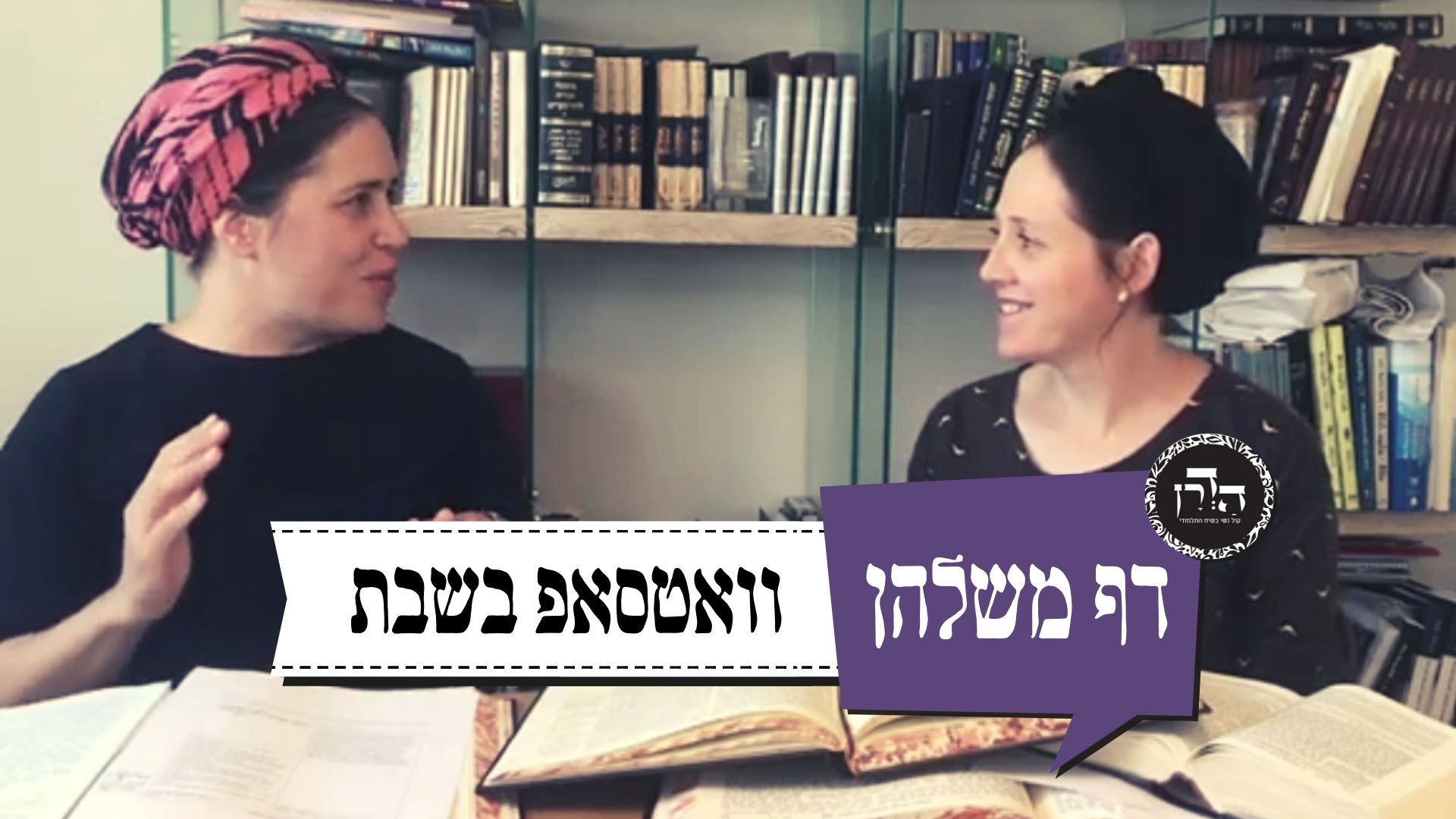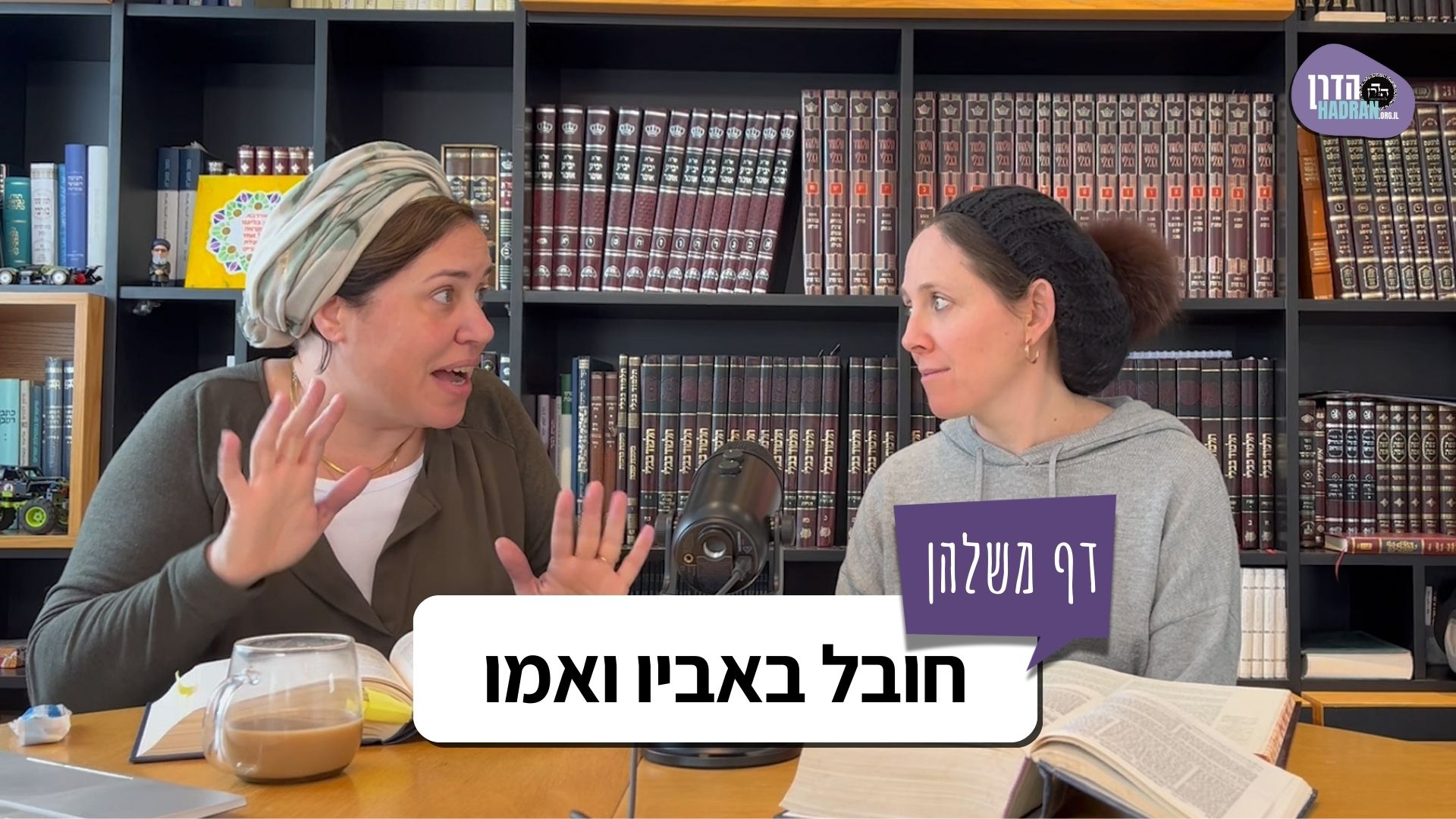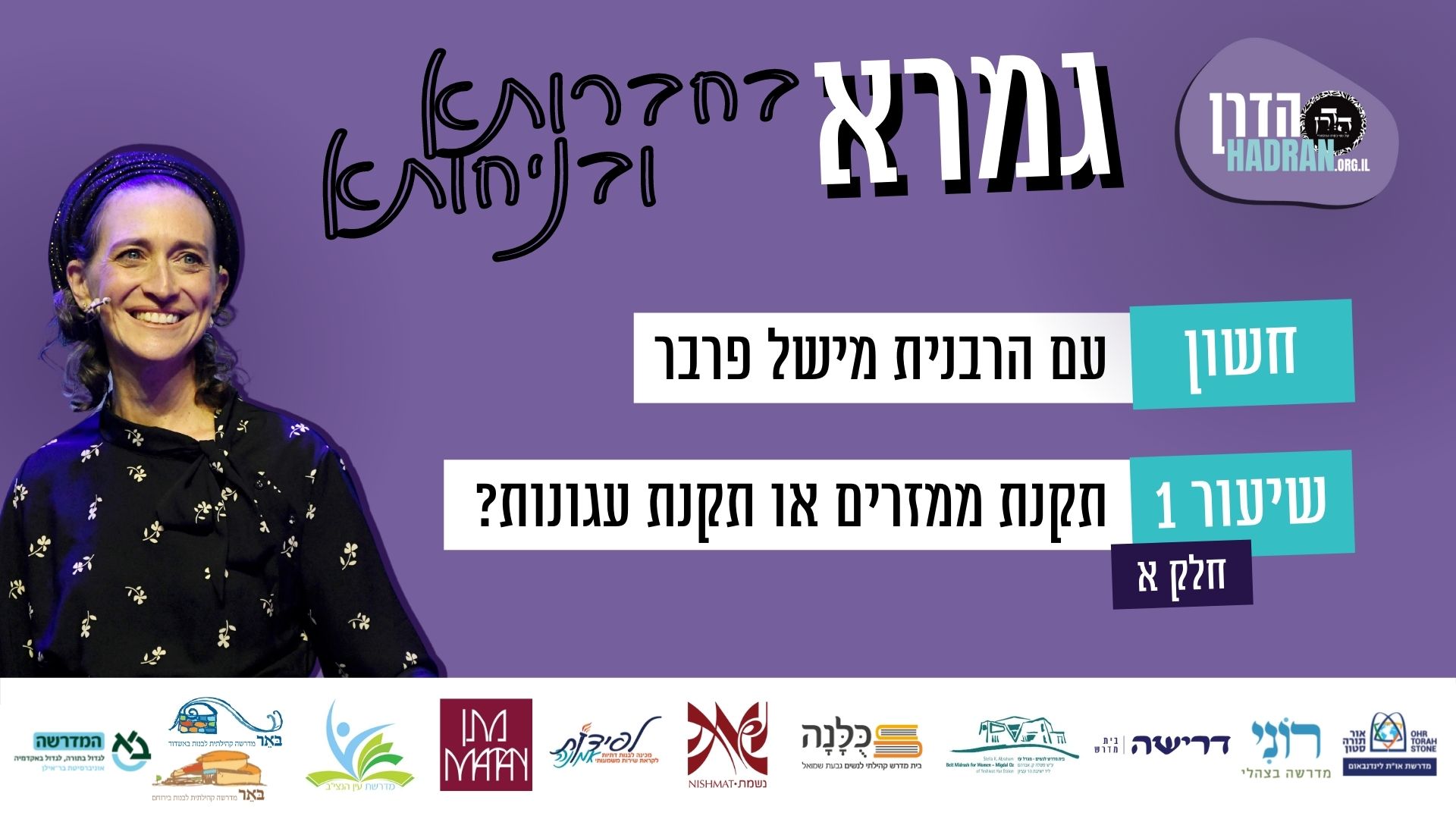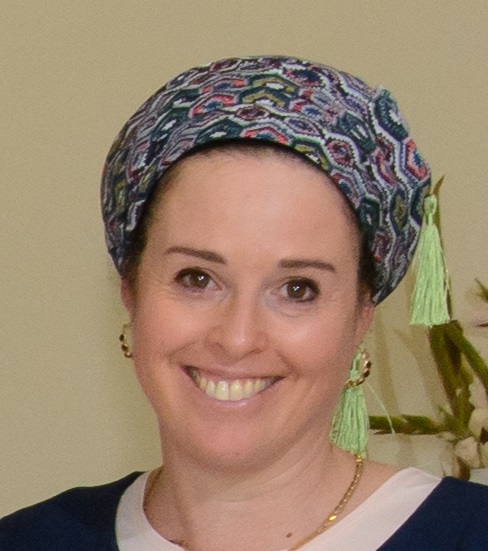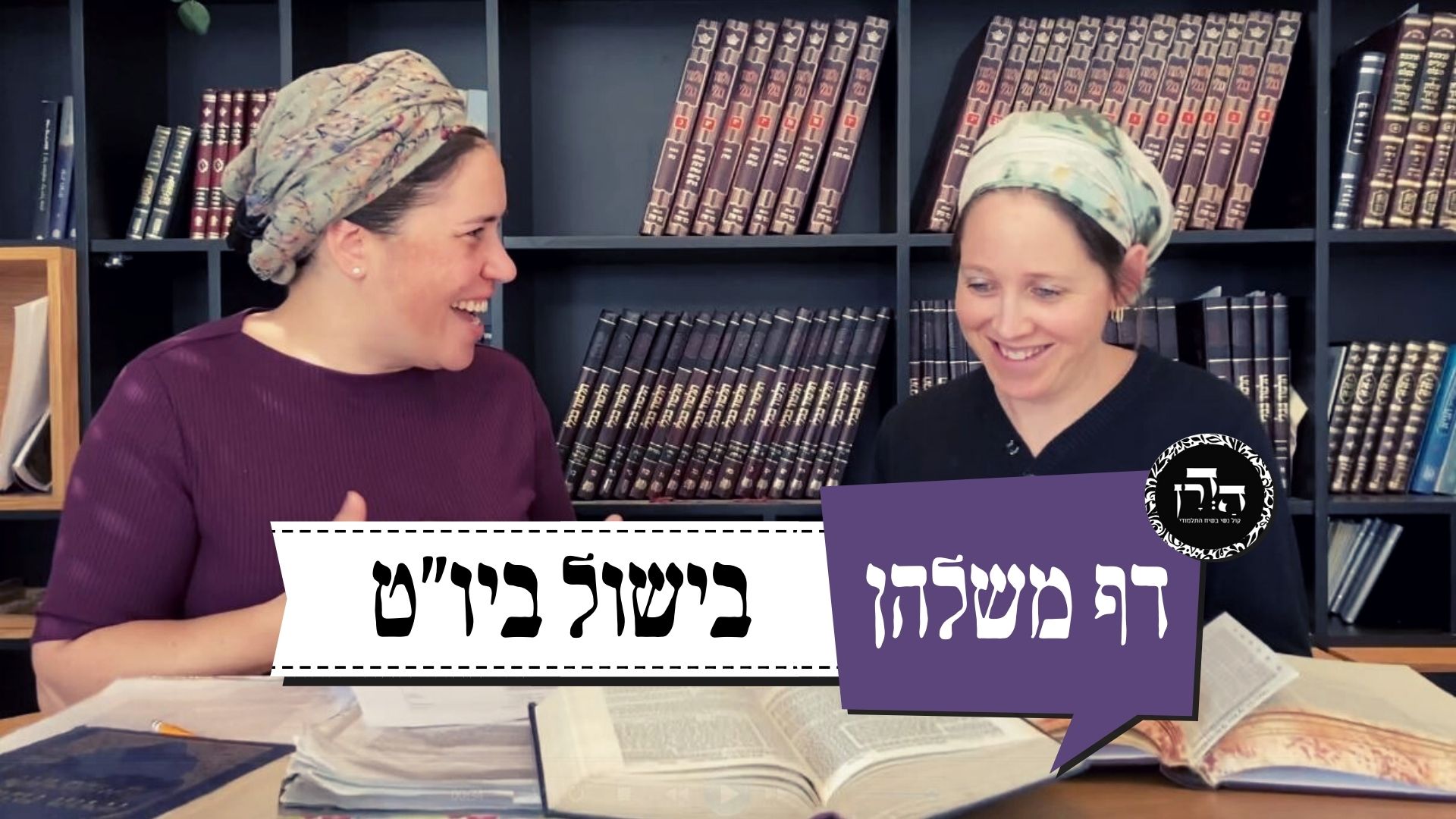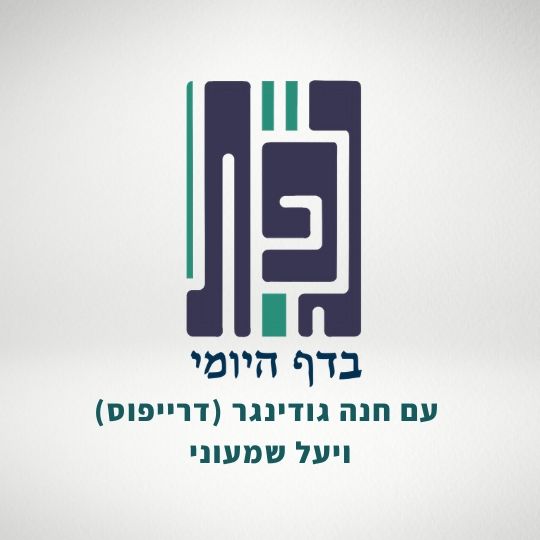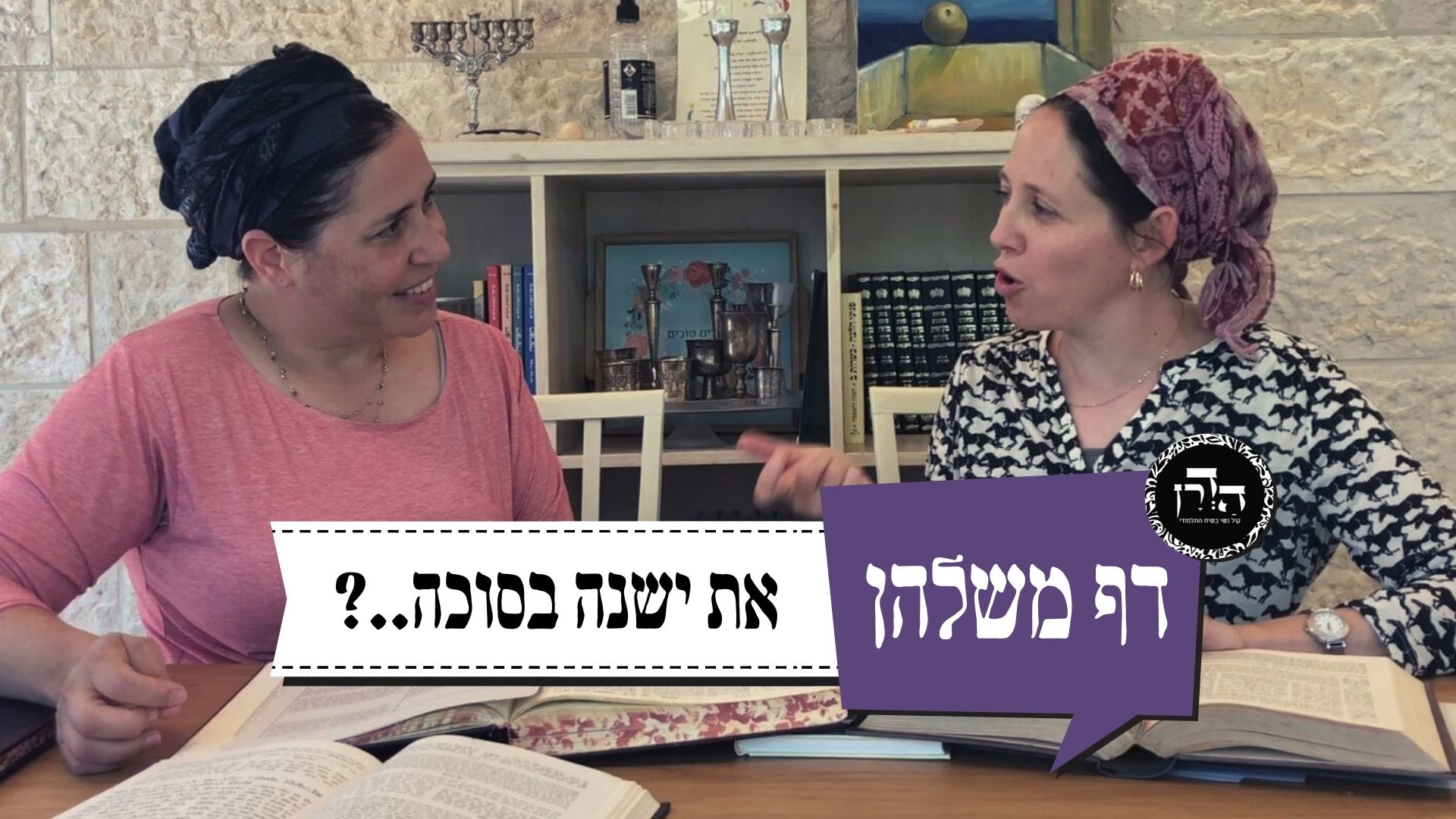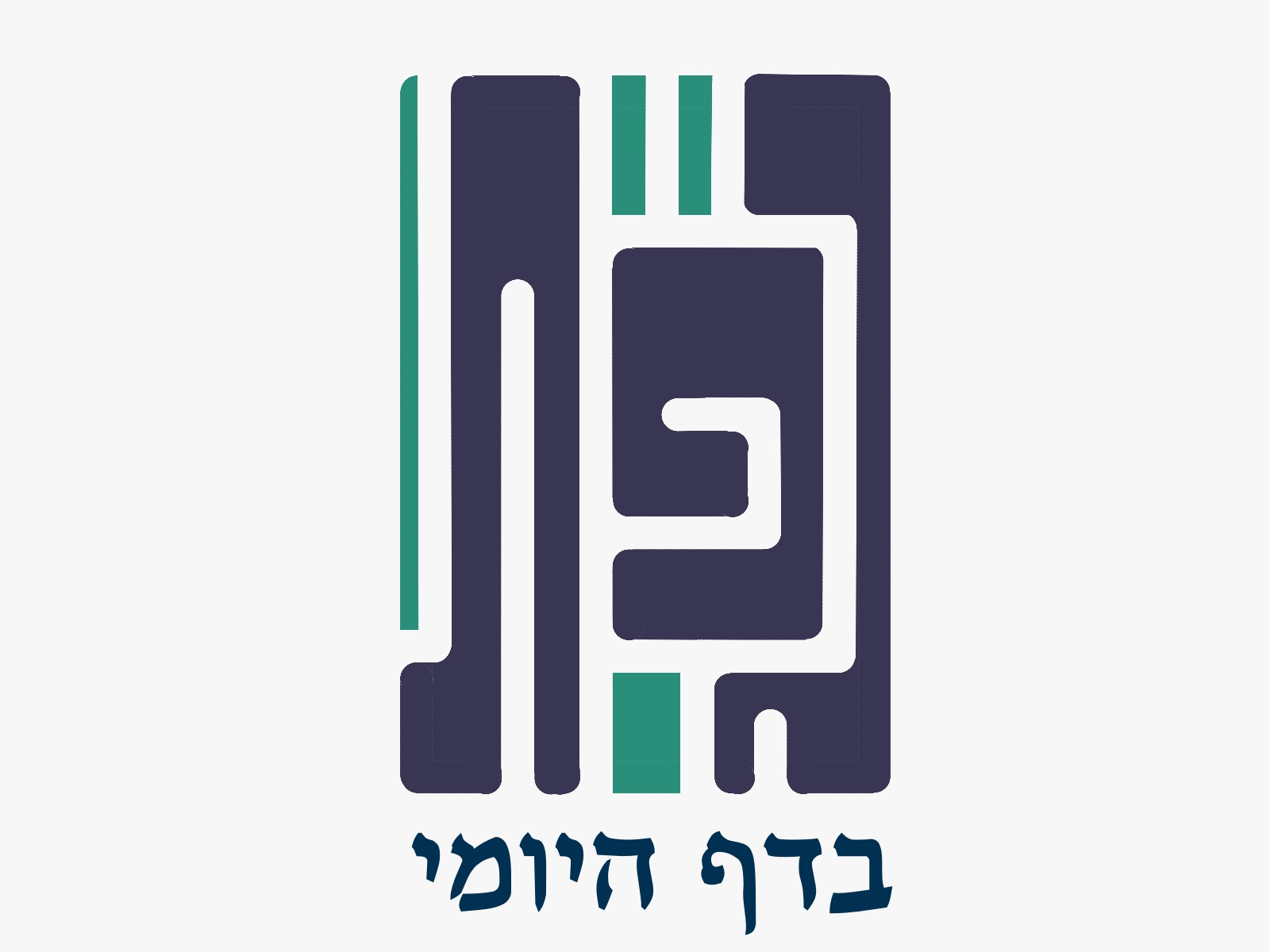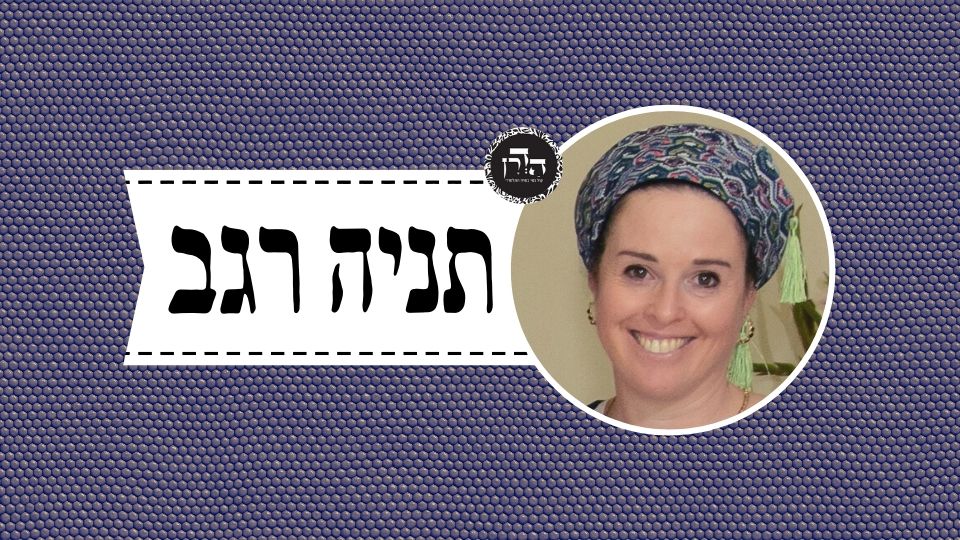האם חופפים ביום לטבול בלילה? האם אפשר לחוף בערב שבת ליום שבת? רבא פסק בעניין ואז תיקנו אותו והוא שינה את דעתו והודיע ברבים. זב או זבה שבדקו ביום שביעי בבוקר ומצאו טהור ואז מצאו כעבור כמה ימים שהם טמאים, האם יש עליהם חזקת טהרה עד הבדיקה שנייה? אם בדקו יום שביעי בבוקר ומצאו טמאים ואז בדקו כעבור כמה ימים ומצאו טהור, האם הם בחזקת טהרה או טומאה בימים שבין הבדיקות? בגלל שימים שעליהם יש דיון הם בימי זיבתה, האם אפשר ללמוד דינים מסויימים לגבי זבה מכאן – כגון האם אפשר לקבוע וסת קבוע בימי זיבתה? בעקרון צריך לבדוק בכל ימי שבעה נקיים – מה אם רק בדק ביום הראשון וביום השביעי? יש מחלוקת תנאים אם זה בסדר, או אם סופרים רק יומיים אלו ולא השאר, או אם רק היום השביעי נחשב. יש מחלוקת אמוראים – מה קורה אם רק בדק ביום הראשון ולא ביום השביעי.
רוצה להקדיש שיעור?
כלים
העמקה
רוצה להבין מה באמת קורה מתחת לפני השטח של הסוגיה?
שיעורים, פודקאסטים והרחבות של מיטב המורות שלנו יפתחו לך עוד זוויות וכיווני חשיבה.
חדשה בלימוד הגמרא?
זה הדף הראשון שלך? איזו התרגשות עצומה! יש לנו בדיוק את התכנים והכלים שיעזרו לך לעשות את הצעדים הראשונים ללמידה בקצב וברמה שלך, כך תוכלי להרגיש בנוח גם בתוך הסוגיות המורכבות ומאתגרות.
פסיפס הלומדות שלנו
גלי את קהילת הלומדות שלנו, מגוון נשים, רקעים וסיפורים. כולן חלק מתנועה ומסע מרגש ועוצמתי.
נדה סח
תִּסְגֵּי אַיְיתִי לִמְחַר, וִידַע מַאי קָאָמְרָה לֵיהּ, אֲמַר: דּוּדֵי חָסְרַתְּ, טַשְׁטָקֵי חָסְרַתְּ, עַבְדֵי חָסְרַתְּ?
Rather, it is sufficient if you come back again tomorrow and speak with me then about this matter. And Rav Naḥman bar Yitzḥak knew what she was saying to him. She was alluding to the fact that she had not washed her hair while it was still daylight, and therefore she could not immerse that evening. Rav Naḥman bar Yitzḥak said to her: Are you lacking kettles [dudei] to heat water to wash your hair? Are you lacking buckets [tashtekei] to bring the water to wash your hair? Are you lacking servants, who can help you prepare to wash your hair? It can be inferred from this story that Rav Naḥman bar Yitzḥak holds that it is permitted for a woman to wash her hair and immerse on the same night.
דְּרַשׁ רָבָא: אִשָּׁה חוֹפֶפֶת בְּעֶרֶב שַׁבָּת וְטוֹבֶלֶת בְּמוֹצָאֵי שַׁבָּת. אֲמַר לֵיהּ רַב פָּפָּא לְרָבָא: וְהָא שְׁלַח רָבִין בְּאִגַּרְתֵּיהּ ״אִשָּׁה לֹא תָּחוֹף בְּעֶרֶב שַׁבָּת וְתִטְבּוֹל בְּמוֹצָאֵי שַׁבָּת״.
§ Rava taught: A woman may wash her hair on the eve of Shabbat and immerse at the conclusion of Shabbat. Rav Pappa said to Rava: But didn’t Ravin send the following halakha in his letter: A woman may not wash her hair on the eve of Shabbat and immerse at the conclusion of Shabbat? Instead, she should wash her hair after the conclusion of Shabbat immediately before she immerses.
וּתְמַהּ עַל עַצְמְךָ: הֵיאַךְ חוֹפֶפֶת בַּיּוֹם וְטוֹבֶלֶת בַּלַּיְלָה, הָא בָּעֵינַן תֵּכֶף לַחֲפִיפָה טְבִילָה, וְלֵיכָּא!
And furthermore, you should be astounded with yourself: How did the Sages deem it permitted for a woman on a weekday to wash her hair during the day and immerse at night? Don’t we require that her immersion must be immediately after washing her hair? And if she washes her hair during the day, this requirement will not be fulfilled. The Sages reluctantly permitted a woman to wash her hair during the day, and they permitted this only due to the concern that she might not wash her hair properly if she would wait until night. Consequently, with regard to an immersion on the conclusion of Shabbat, she should avoid washing her hair a day or more in advance.
הֲדַר אוֹקִי רָבָא אָמוֹרָא עֲלֵיהּ, וּדְרַשׁ: דְּבָרִים שֶׁאָמַרְתִּי לִפְנֵיכֶם, טָעוּת הֵן בְּיָדִי. בְּרַם כָּךְ אָמְרוּ מִשְּׁמֵיהּ דְּרַבִּי יוֹחָנָן: אִשָּׁה לֹא תָּחוֹף בְּעֶרֶב שַׁבָּת וְתִטְבּוֹל בְּמוֹצָאֵי שַׁבָּת, וּתְמַהּ עַל עַצְמְךָ: הֵיאַךְ חוֹפֶפֶת בַּיּוֹם וְטוֹבֶלֶת בַּלַּיְלָה? הָא בָּעֵינַן סָמוּךְ לַחֲפִיפָה טְבִילָה, וְלֵיכָּא!
As a result of Rav Pappa’s comments, Rava then appointed an interpreter before him to publicize his retraction, and he taught: The statement I said to you was a mistake of mine. But in fact this is what the Sages said in the name of Rabbi Yoḥanan: A woman may not wash her hair on the eve of Shabbat and immerse after the conclusion of Shabbat. And furthermore you should be astounded with yourself. How can a woman wash her hair during the day and immerse at night? Don’t we require: Her immersion must be immediately after washing her hair? And if she washes her hair on the eve of Shabbat, this principle will not be fulfilled.
וְהִלְכְתָא: אִשָּׁה חוֹפֶפֶת בַּיּוֹם וְטוֹבֶלֶת בַּלַּיְלָה. וְהִלְכְתָא: אִשָּׁה לֹא תָּחוֹף אֶלָּא בַּלַּיְלָה. (אֶלָּא) קַשְׁיָא הִלְכְתָא אַהִלְכְתָא!
The Gemara concludes: And the halakha is that a woman may wash her hair during the day and immerse at night. And the halakha is that a woman may wash her hair only at night. The Gemara comments: This is difficult, as one halakha contradicts the other halakha.
לָא קַשְׁיָא — הָא דְּאֶפְשָׁר, הָא דְּלָא אֶפְשָׁר.
The Gemara answers: It is not difficult. This ruling that she may wash her hair during the day is referring to a case where it is possible, e.g., when she immerses on a weeknight and can wash her hair shortly beforehand during the daytime. That ruling that she is permitted to wash her hair only at night is referring to a case where it is not possible, e.g., when her time for immersion is after the conclusion of Shabbat. Since she may not wash her hair on the eve of Shabbat for an immersion after the conclusion of Shabbat, she must wash her hair at night, after Shabbat has ended, immediately before she immerses.
מַתְנִי’ נִדָּה שֶׁבָּדְקָה עַצְמָהּ יוֹם שְׁבִיעִי שַׁחֲרִית, וּמָצְאָה טְהוֹרָה, וּבֵין הַשְּׁמָשׁוֹת לֹא הִפְרִישָׁה, וּלְאַחַר יָמִים בָּדְקָה וּמָצְאָה טְמֵאָה — הֲרֵי הִיא בְּחֶזְקַת טְהוֹרָה.
MISHNA: In the case of a menstruating woman who examined herself on the seventh day of menstruation in the morning and found that she is ritually pure and eligible to immerse in a ritual bath that evening, but during twilight of the seventh day she did not perform an examination that marks the transition between the days when she has a flow of blood and the days when she no longer has a flow of blood but immersed despite not having performed the examination, and after several days she examined herself and found that she is ritually impure, the presumptive status of that woman is one of ritual purity from the time of her immersion until her examination, and all ritually pure items that she handled in the interim remain pure.
בָּדְקָה עַצְמָהּ בְּיוֹם שְׁבִיעִי שַׁחֲרִית וּמָצְאָה טְמֵאָה, וּבֵין הַשְּׁמָשׁוֹת לֹא הִפְרִישָׁה, וּלְאַחַר זְמַן בָּדְקָה וּמָצְאָה טְהוֹרָה — הֲרֵי זוֹ בְּחֶזְקַת טְמֵאָה.
If she examined herself on the seventh day of menstruation in the morning and found that she is ritually impure, i.e., her menstrual flow continued, and during twilight of the seventh day she did not perform an examination to confirm the transition from ritual impurity to ritual purity but immersed nonetheless, and after several days she examined herself and found that she is ritually pure, the presumptive status of that woman is one of ritual impurity from the time of her immersion until her examination, and all ritually pure items that she handled in the interim are impure. Since she found blood during her last examination in her days of menstruation, the concern is that the flow of blood continued during the days that followed, and therefore her immersion on the eve of the eighth day was ineffective.
וּמְטַמְּאָה מֵעֵת לְעֵת, וּמִפְּקִידָה לִפְקִידָה. וְאִם יֵשׁ לָהּ וֶסֶת — דַּיָּה שְׁעָתָהּ.
In a case where there was no blood found during the examination on the seventh morning and she did not examine herself during twilight, and several days later she discovered blood, where the mishna says that a woman’s presumptive status is one of ritual purity, that is the halakha only for the days following immersion. But she transmits ritual impurity to the ritually pure items that she handled before the examination in which she found blood for a twenty-four-hour period and from examination to examination, in accordance with the halakha of a woman who experiences bleeding (see 2a). And if she has a fixed menstrual cycle, on the day that she examined herself and found blood, her time is sufficient, i.e., it is assumed that the bleeding began then, and she does not transmit impurity retroactively.
וְרַבִּי יְהוּדָה אוֹמֵר: כֹּל שֶׁלֹּא הִפְרִישָׁה בְּטָהֳרָה מִן הַמִּנְחָה וּלְמַעְלָה — הֲרֵי זוֹ בְּחֶזְקַת טְמֵאָה, וַחֲכָמִים אוֹמְרִים: אֲפִילּוּ בִּשְׁנַיִם לְנִדָּתָהּ בָּדְקָה וּמָצְאָה טְהוֹרָה, וּבֵין הַשְּׁמָשׁוֹת לֹא הִפְרִישָׁה, וּלְאַחַר זְמַן בָּדְקָה וּמָצְאָה טְמֵאָה — הֲרֵי זוֹ בְּחֶזְקַת טְהוֹרָה.
And Rabbi Yehuda says: With regard to any woman who did not perform the examination marking her transition from ritual impurity to ritual purity on the seventh day from minḥa time onward, even if she performed an examination and found no blood that morning, the presumptive status of that woman is one of ritual impurity. And the Rabbis say: Even if on the second day of her menstruation she performed the examination and found that she is ritually pure, and she did not perform the examination marking her transition from ritual impurity to ritual purity on the seventh day during twilight, and after several days she examined herself and found that she is ritually impure, the presumptive status of that woman is one of ritual purity from the time of her immersion until her examination.
גְּמָ’ אִיתְּמַר: רַב אָמַר: זָבָה וַדַּאי, וְלֵוִי אָמַר: זָבָה סָפֵק.
GEMARA: The Gemara cites a dispute between amora’im with regard to a case where a woman did not perform an examination indicating her transition from ritual impurity to ritual purity, and three days passed in which it is possible that she received the status of a zava, and then she found that she was ritually impure. It was stated that Rav says: This woman is a definite greater zava. And Levi says: She is an uncertain greater zava.
אַהֵיָיא? אִילֵּימָא אַרֵישָׁא — ״הֲרֵי זוֹ בְּחֶזְקַת טְהוֹרָה״ קָתָנֵי!
The Gemara asks: To which clause of the mishna does this dispute apply? If we say that Rav and Levi are referring to the first clause, i.e., a woman who examined herself on the morning of the seventh day and found herself to be ritually pure, but she did not examine herself at twilight, and several days later she examined herself and found herself to be impure, this cannot be correct, as the mishna teaches: The presumptive status of that woman is one of ritual purity. She is not a zava at all.
אֶלָּא אַסֵּיפָא, בִּשְׁלָמָא סְפֵק זָבָה אָמְרִינַן, אֶלָּא זָבָה וַדַּאי נָמֵי? הֲרֵי בָּדְקָה וּמָצְאָה טְהוֹרָה!
Rather, say that they are referring to the latter clause of the mishna, when she examined herself on the morning of the seventh day and found herself to be ritually impure. If so, granted Levi’s opinion is reasonable, as we say that this woman is an uncertain greater zava. But how can one explain Rav’s opinion that she is even a definite greater zava? After all, she examined herself and found that she is ritually pure. If so, how can she be a definite zava?
אֶלָּא, כִּי אִיתְּמַר דְּרַב וְלֵוִי — שְׁמַעְתָּא בְּאַפֵּי נַפְשַׁהּ אִיתְּמַר: נִדָּה שֶׁבָּדְקָה עַצְמָהּ בְּיוֹם הַשְּׁבִיעִי שַׁחֲרִית וּמָצְאָה טְמֵאָה, וּבֵין הַשְּׁמָשׁוֹת לֹא הִפְרִישָׁה, וּלְאַחַר יָמִים בָּדְקָה וּמָצְאָה טְמֵאָה — רַב אָמַר: זָבָה וַדַּאי, וְלֵוִי אָמַר: זָבָה סָפֵק.
Rather, when the dispute of Rav and Levi was stated, it was stated as a distinct halakha unrelated to the mishna, as follows: With regard to a menstruating woman who examined herself on the seventh day in the morning and found that she was ritually impure, and at twilight of the seventh day she did not perform an examination to confirm her transition from ritual impurity to ritual purity, and after several days she examined herself and found that she is ritually impure, Rav says: This woman is a definite greater zava. And Levi says: She is an uncertain greater zava.
רַב אָמַר: זָבָה וַדַּאי, כֵּיוָן דְּמֵעִיקָּרָא נִמְצֵאת טְמֵאָה, וְעַכְשָׁיו נִמְצֵאת טְמֵאָה — טְמֵאָה וַדַּאי. וְלֵוִי אָמַר: סְפֵק זָבָה, אֵימַר פְּסַקָה בֵּינֵי וּבֵינֵי.
The Gemara explains their opinions. Rav says: This woman is a definite greater zava, since from the outset she found herself to be ritually impure, and now she found herself to also be ritually impure. Consequently, she is definitely impure. And Levi says: This woman is an uncertain greater zava, as one can say that perhaps she stopped experiencing bleeding in between the morning of her seventh day of menstruation when she first found herself to be impure and several days later, on the second occasion that she found herself to be impure.
וְכֵן תָּנֵי לֵוִי בְּמַתְנִיתָא: אַחַר הַיָּמִים, בֵּין בָּדְקָה וּמָצְאָה טְהוֹרָה בֵּין בָּדְקָה וּמָצְאָה טְמֵאָה — הֲרֵי זוֹ סְפֵק זָבָה.
And Levi taught similarly in a baraita: If a woman examined herself on the seventh day of menstruation and found herself to be impure, and she did not perform the examination to confirm her transition from ritual impurity to ritual purity, and after several days she examined herself, whether she examined herself and found herself to be ritually pure or whether she examined herself and found herself to be ritually impure, she is an uncertain greater zava.
וּמְטַמְּאָה מֵעֵת לְעֵת. לֵימָא תִּהְוֵי תְּיוּבְתָּא דְּרָבָא! דְּאָמַר רָבָא: לוֹמַר שֶׁאֵין הָאִשָּׁה מְטַמְּאָה מֵעֵת לְעֵת בְּתוֹךְ יְמֵי זִיבָתָהּ!
§ The mishna teaches: But she transmits ritual impurity to the ritually pure items that she handled before the examination in which she found blood for a twenty-four-hour period. The Gemara suggests: Let us say that it is a conclusive refutation of the opinion of Rava, as Rava said, with regard to the statement in the mishna on 38b that a woman has a presumptive status of ritual purity during the eleven days of potential ziva: This serves to say that a woman does not transmit ritual impurity for a twenty-four-hour period before experiencing bleeding during her days of ziva.
וְלָאו אוֹתְבִינֵּיהּ לְרָבָא חֲדָא זִימְנָא! הָכִי קָאָמְרִינַן: לֵימָא תִּהְוֵי תְּיוּבְתָּא דְּרָבָא נָמֵי מֵהָא!
The Gemara asks: But didn’t the Gemara already cite a conclusive refutation of the opinion of Rava one time, on 39a? The Gemara explains that this is what we are saying: Let us say that there is a conclusive refutation of the opinion of Rava from this mishna as well.
אָמַר לָךְ רָבָא: כִּי קָתָנֵי ״מְטַמְּאָה מֵעֵת לְעֵת״ — אַרֵישׁ פִּרְקִין קָאֵי, אַרָאֲתָה וְעוֹדָהּ בְּבֵית אָבִיהָ.
The Gemara responds that Rava could have said to you that when the mishna teaches: She transmits ritual impurity for a twenty-four-hour period, it is referring to the beginning of our chapter. Specifically, it is speaking of the mishna on 64b, which discusses the case of a young woman who saw menstrual blood before marriage while she was still in her father’s house. According to Beit Hillel she may engage in intercourse only the first night, during which the blood is considered the blood from the torn hymen rather than the blood of menstruation. This mishna is teaching that from that point onward, when she experiences bleeding she renders items impure retroactively for a twenty-four-hour period, like other women.
סָלְקָא דַעְתָּךְ אָמֵינָא, כֵּיוָן דְּמַפְסְקִי לְהוּ יָמִים טְהוֹרִין, כִּתְחִלַּת נִדָּתָהּ דָּמְיָא, וְלֹא תְּטַמֵּא מֵעֵת לְעֵת, קָא מַשְׁמַע לַן.
The Gemara explains that this ruling is necessary, as it might enter your mind to say that since her cycle of menstruation and ziva is interrupted by days when any blood she discharges is considered to be ritually pure, she now reverts back as though it is considered like the beginning of her days of menstruation, and she does not transmit ritual impurity retroactively for a twenty-four-hour period. Therefore, this mishna teaches us that she does transmit impurity retroactively.
אִם יֵשׁ לָהּ וֶסֶת. נֵימָא תִּהְוֵי תְּיוּבְתָּא דְּרַב הוּנָא בַּר חִיָּיא אָמַר שְׁמוּאֵל, דְּאָמַר רַב הוּנָא בַּר חִיָּיא אָמַר שְׁמוּאֵל, לוֹמַר שֶׁאֵין הָאִשָּׁה קוֹבַעַת לָהּ וֶסֶת בִּימֵי זִיבָתָהּ.
§ The mishna teaches: And if she has a fixed menstrual cycle on the day that she examined herself and found blood, her time is sufficient and she does not transmit impurity retroactively. The Gemara asks: Shall we say that this is a conclusive refutation of the opinion of Rav Huna bar Ḥiyya, with regard to the ruling he says that Shmuel says? As Rav Huna bar Ḥiyya says that Shmuel says, with regard to the mishna on 38b that teaches that a woman has a presumptive status of ritual purity during the eleven days of potential ziva: This serves to say that a woman does not establish a fixed menstrual cycle during her days of ziva.
אָמַר לְךָ רַב הוּנָא בַּר חִיָּיא: כִּי אָמְרִינַן אֵין אִשָּׁה קוֹבַעַת לָהּ וֶסֶת בִּימֵי זִיבָתָהּ, דְּלָא בָּעֲיָא תְּלָתָא זִימְנֵי לְמִיעְקַר, דְּאָמְרִינַן דָּמֶיהָ מְסוּלָּקִין, וְכֵיוָן דְּדָמֶיהָ מְסוּלָּקִין — דַּיָּהּ שְׁעָתָהּ.
The Gemara answers that Rav Huna bar Ḥiyya could have said to you: When we say that a woman does not establish a fixed menstrual cycle during her days of ziva, we meant this only as a leniency, that she does not require three times to uproot any such cycle. Rather, she uproots it after one time when she does not experience bleeding in accordance with that cycle. As we say that her menstrual blood is removed during her days of ziva, and she is unlikely to discharge menstrual blood during that time. And since her blood is removed, if she established a fixed menstrual cycle it is sufficient for her to be deemed impure from the hour that she saw the menstrual flow. There is no decree of retroactive impurity on items that she previously touched due to the concern that the blood flow might have started earlier.
רַבִּי יְהוּדָה אוֹמֵר. תַּנְיָא, אָמְרוּ לוֹ לְרַבִּי יְהוּדָה: אִלְמָלֵי יָדֶיהָ מוּנָּחוֹת בְּעֵינֶיהָ כׇּל בֵּין הַשְּׁמָשׁוֹת — יָפֶה אַתָּה אוֹמֵר.
§ The mishna teaches that Rabbi Yehuda says: With regard to any woman who did not perform the examination indicating her transition from ritual impurity to ritual purity on the seventh day from minḥa time onward, even if she performed an examination and found no blood that morning, the presumptive status of that woman is one of ritual impurity. It is taught in a baraita that the Rabbis said to Rabbi Yehuda: If the halakha had been that a woman who will immerse must keep her hands placed in her eyes, a euphemism for her vagina, for the entire twilight period, what you say is fine. It would be reasonable to assume that since she did not examine herself at the end of the day she has a presumptive status of ritual impurity.
עַכְשָׁיו אֵימַר: עִם סִלּוּק יָדֶיהָ רָאֲתָה? מָה לִי הִפְרִישָׁה בְּטָהֳרָה בַּשְּׁבִיעִי מִן הַמִּנְחָה וּלְמַעְלָה, מָה לִי הִפְרִישָׁה בְּטָהֳרָה בָּרִאשׁוֹן.
But now that you say that it is insufficient to examine herself in the morning, what is your reasoning? Evidently, you say that when she removed her hand from examining herself perhaps she saw blood and is impure. If so, what difference is it to me if she performed the examination indicating her transition from ritual impurity to ritual purity on the seventh day from minḥa time onward, and what difference is it to me if she performed the examination indicating her transition from ritual impurity to ritual purity on the first day of her counting?
בָּרִאשׁוֹן — מִי אִיכָּא לְמַאן דְּאָמַר?
The Gemara asks: Why do the Rabbis mention an examination on the first day of her counting? Is there one who said that if a woman examines herself only on the first day that is sufficient?
אִין, וְהָתַנְיָא: אָמַר רַבִּי: שָׁאַלְתִּי אֶת רַבִּי יוֹסֵי וְרַבִּי שִׁמְעוֹן כְּשֶׁהָיוּ מְהַלְּכִים בַּדֶּרֶךְ: נִדָּה שֶׁבָּדְקָה עַצְמָהּ יוֹם שְׁבִיעִי שַׁחֲרִית וּמָצְאָה טְהוֹרָה, וּבֵין הַשְּׁמָשׁוֹת לֹא הִפְרִישָׁה, וּלְאַחַר הַיָּמִים בָּדְקָה וּמָצְאָה טְמֵאָה — מַהוּ?
The Gemara answers: Yes, there is such an opinion, as it is taught in a baraita that Rabbi Yehuda HaNasi says: I asked Rabbi Yosei and Rabbi Shimon the following question when they were walking on the road: With regard to a menstruating woman who examined herself on the seventh day in the morning and found herself to be ritually pure, but at twilight she did not perform the examination indicating her transition from ritual impurity to ritual purity, and after several days she examined herself and found herself to be ritually impure, what is the halakha?
אָמְרוּ לִו: הֲרֵי זוֹ בְּחֶזְקַת טׇהֳרָה. שִׁשִּׁי, חֲמִישִׁי, רְבִיעִי, שְׁלִישִׁי, שֵׁנִי — מַאי? אָמְרוּ לִו: לָא שְׁנָא.
Rabbi Yosei and Rabbi Shimon said to him: She has a presumptive status of ritual purity up until the moment that she discovered that she was impure. Rabbi Yehuda HaNasi asked them additional questions: If she examined herself on the sixth day, or the fifth day, or the fourth day, or the third day, or even the second day, what is the halakha? Rabbi Yosei and Rabbi Shimon said to him: The halakha is no different. In all of these cases she has a presumptive status of ritual purity until she discovers that she is impure.
בָּרִאשׁוֹן לֹא שָׁאַלְתִּי, וְטָעִיתִי שֶׁלֹּא שָׁאַלְתִּי, אַטּוּ כּוּלְּהוּ לָאו בְּחֶזְקַת טוּמְאָה קָיְימִי? וְכֵיוָן דִּפְסַק — פְּסַק, רִאשׁוֹן נָמֵי כֵּיוָן דִּפְסַק — פְּסַק.
Rabbi Yehuda HaNasi comments: I did not ask about a woman who examined herself on the first day, and I erred in that I did not ask them. If I would have asked them they would have told me that even if she examined herself only on the first day, she still has a presumptive status of ritual purity. Rabbi Yehuda HaNasi explains his reasoning: Is that to say that on all of these other days she was not standing with a presumptive status of ritual impurity? And nevertheless, once she performed the examination and her blood is found to have stopped, it is considered to have stopped, and she now has the presumptive status of a woman whose bleeding has stopped. If so, on the first day too, once she performed the examination and her blood is found to have stopped, it is considered to have stopped, and she now has a presumptive status of a woman whose bleeding has stopped.
וּמֵעִיקָּרָא, מַאי סָבַר? הוֹאִיל וְהוּחְזַק מַעְיָן פָּתוּחַ.
The Gemara asks: And initially, what did Rabbi Yehuda HaNasi hold? Why didn’t he ask them about a woman who examined herself only on the first day? The Gemara answers that he held that since she has a presumptive status that her spring, i.e., her uterus, is open, as she had just begun experiencing bleeding, an examination conducted on that day is ineffective. In any event, this baraita teaches that there is an opinion that even if a woman examined herself only on the first day, she has a presumptive status of ritual purity.
מַתְנִי’ הַזָּב וְהַזָּבָה, שֶׁבָּדְקוּ עַצְמָן בְּיוֹם רִאשׁוֹן וּמָצְאוּ טָהוֹר, וּבַיּוֹם הַשְּׁבִיעִי וּמָצְאוּ טָהוֹר, וּשְׁאָר יָמִים שֶׁבֵּינְתַיִים לֹא בָּדְקוּ — רַבִּי אֱלִיעֶזֶר אוֹמֵר: הֲרֵי הֵן בְּחֶזְקַת טׇהֳרָה. רַבִּי יְהוֹשֻׁעַ אוֹמֵר: אֵין לָהֶם אֶלָּא יוֹם רִאשׁוֹן וְיוֹם שְׁבִיעִי בִּלְבָד. רַבִּי עֲקִיבָא אוֹמֵר: אֵין לָהֶם אֶלָּא יוֹם שְׁבִיעִי בִּלְבָד.
MISHNA: With regard to a zav and a zava, who are required to count and examine themselves on each of seven clean days before purification in a ritual bath, who examined themselves on the first day and found themselves ritually pure, i.e., with no blood, and they examined themselves on the seventh day and found themselves ritually pure, and on the rest of the intervening days they did not examine themselves, Rabbi Eliezer says: The presumptive status of the zav and the zava is one of ritual purity. Rabbi Yehoshua says: In that case, the zav and the zava have counted only the first day and the seventh day, two of the seven clean days, and they must count another five days to complete the tally. Rabbi Akiva says: The zav and the zava have counted only the seventh day, and they must count another six days to complete the tally.
גְּמָ’ תַּנְיָא: אָמַר לוֹ רַבִּי אֱלִיעֶזֶר לְרַבִּי יְהוֹשֻׁעַ: לִדְבָרֶיךָ, אַתָּה מוֹנֶה בְּסֵירוּגִין, וְהַתּוֹרָה אָמְרָה ״אַחַר תִּטְהָר״, אַחַר אַחַר לְכוּלָּן, שֶׁלֹּא תְּהֵא טוּמְאָה מַפְסֶקֶת בֵּינֵיהֶן!
GEMARA: It is taught in a baraita that Rabbi Eliezer said to Rabbi Yehoshua: According to your statement, that the first day is included in her count of seven, you are counting at intervals, i.e., with days in-between that do not count, and the Torah states: “But if she be purified of her ziva, then she shall count to herself seven days, and after that she shall be pure” (Leviticus 15:28). This teaches that the purification of a zava must be after the seven days, i.e., after all of the days, which must be consecutive so that there are no days of impurity separating between the seven clean days.
אָמַר לוֹ רַבִּי יְהוֹשֻׁעַ: וְאַתָּה אִי אַתָּה מוֹדֶה בְּזָב שֶׁרָאָה קֶרִי, וּבְנָזִיר שֶׁהִילֵּךְ סְכָכוֹת וּפְרָעוֹת, שֶׁמּוֹנֶה בְּסֵירוּגִין? וְהַתּוֹרָה אָמְרָה: ״וְהַיָּמִים הָרִאשׁוֹנִים יִפְּלוּ״.
Rabbi Yehoshua says: And you too, do you not concede with regard to a zav who experienced a seminal emission during his count of seven clean days, and with regard to a nazirite who walked under overhanging boughs and protrusions that have items whose status of impurity is uncertain beneath them, that they count at intervals, as both are impure for one day before resuming their counting? And yet the Torah states with regard to a nazirite who definitely contracted ritual impurity from a corpse: “But the former days shall be void, because his consecration was defiled” (Numbers 6:12). This indicates that even in cases where the Torah says that one must count consecutively, it is permitted to count with intervals in between countings.
וְרַבִּי אֱלִיעֶזֶר, בִּשְׁלָמָא הָתָם, ״לְטׇמְאָה בָהּ״ אָמַר רַחֲמָנָא — שֶׁאֵינָהּ סוֹתֶרֶת אֶלָּא יוֹמָהּ, וְאִי מִשּׁוּם אִיחַלּוֹפֵי זָב בְּבַעַל קֶרִי — לָא מִיחַלַּף.
And how would Rabbi Eliezer respond to Rabbi Yehoshua’s claim? He would say: Granted, there in the cases of the zav and the nazirite, the Merciful One states: “This is the law of him that has an issue, and of him from whom an emission of semen goes out, so that he is thereby impure” (Leviticus 15:32). This teaches that when a zav experiences a seminal emission it overturns the counting of only that one day. And if one would claim that the Sages should issue a decree due to the concern that one might confuse the halakha of one who had an emission of ziva during the seven clean days with a zav who had a seminal emission during the seven clean days, that is not a concern. The reason is that an emission of a ziva will not be confused with the case of one who experienced a seminal emission.
נָזִיר שֶׁהִילֵּךְ עַל גַּבֵּי סְכָכוֹת וּפְרָעוֹת נָמֵי, מִדְּאוֹרָיְיתָא אֹהֶל מְעַלְּיָא בָּעֵינַן, וְרַבָּנַן הוּא דִּגְזוּר, וְרַבָּנַן בִּדְאוֹרָיְיתָא לָא מִיחַלַּף.
Similarly, Rabbi Eliezer would say that in the case of a nazirite who walked under overhanging boughs and protrusions that have items whose status of impurity is uncertain beneath them, there is also no need to overturn all the previous days of counting, as by Torah law we require a full-fledged tent over a corpse, and it was the Sages who decreed that one who walks under overhanging boughs and protrusions is ritually impure. And a halakha that applies by rabbinic law will not be confused with a halakha that is mandated by Torah law.
אֲבָל הָכָא — אִי חָיְישִׁינַן דִּלְמָא חֲזַאי, בְּסָפֵק אָתֵי לְאִיחַלּוֹפֵי בְּוַדַּאי.
But here, in the case of a zava who counts only the first and seventh day, if we are concerned that as she did not count the five intermediate days perhaps she saw blood during those days, and since what occurred on those days is uncertain, only the first day counts for her, then one might come to confuse this situation with a case where she is certain that she saw blood during the intermediate days. One might mistakenly think that even if she definitely experiences bleeding during the intermediate days she can still count the first day as one of her seven clean days before immersing.
תָּנֵי רַבִּי יוֹסֵי וְרַבִּי שִׁמְעוֹן אָמְרִי: נִרְאִין דִּבְרֵי רַבִּי אֱלִיעֶזֶר מִדִּבְרֵי רַבִּי יְהוֹשֻׁעַ, וְדִבְרֵי רַבִּי עֲקִיבָא מִדִּבְרֵי כּוּלָּן, אֲבָל הֲלָכָה כְּרַבִּי אֱלִיעֶזֶר.
It is taught in a baraita that Rabbi Yosei and Rabbi Shimon say: The statement of Rabbi Eliezer appears more correct than the statement of Rabbi Yehoshua, and the statement of Rabbi Akiva appears more correct than the statement of all of them. But nevertheless, the halakha is in accordance with the opinion of Rabbi Eliezer.
אִיבַּעְיָא לְהוּ: הַזָּב וְהַזָּבָה שֶׁבָּדְקוּ עַצְמָן יוֹם רִאשׁוֹן וְיוֹם שְׁמִינִי וּמָצְאוּ טָהוֹר, וּשְׁאָר הַיָּמִים לֹא בָּדְקוּ,
§ A dilemma was raised before the Sages: With regard to a zav and a zava who examined themselves on the first day of their seven clean days and found themselves to be pure, and they examined themselves again on the eighth day and found themselves to be pure, but they did not examine themselves on the remainder of the days,


